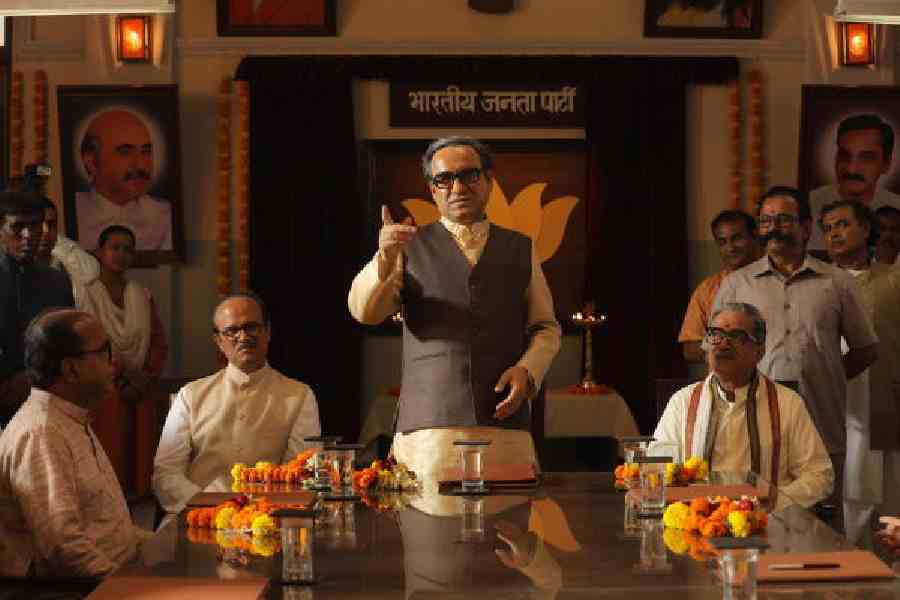We are sitting at less than six months to May. There is the high-profile inauguration of a place of worship a few days away. A newly-opened bridge has quickly become a selfie spot. A biopic has already been released in theatres. There is a whiff of propaganda in the air, and there is no escaping it. It’s all blowin’ in the wind.
Except that Main Atal Hoon, on the surface, didn’t seem to be a piece of agitprop. One, because the man whose life and times are the focus of this biopic wasn’t known to be the kind of rabid, hate-mongering politician that we increasingly see in packs around us. Second, he is being played by an actor who is not only known to be one of the best we have today but is also someone whose honesty, integrity and genuineness always shine through. I hoped that I wasn’t walking into the kind of hagiographic filmmaking that we have been subjected to in recent times. Thankfully, I wasn’t.
Main Atal Hoon is not a hagiography in the blunt sense of the word, but it is a eulogy. The film, directed by Ravi Jadhav, looks at the man in the centre — former Prime Minister Atal Bihari Vajpayee, played by Pankaj Tripathi — through the lens of his achievements alone and with the kind of single-note treatment that most biopics made in Bollywood are known to suffer from. Another affliction that plagues Main Atal Hoon — this is 139 minutes of an acute bore-fest, redeemed by only a few moments here and there.
Starting from the time when a young Atal takes on a tyrannical British cop in pre-Independence India, brings down the Union Jack overnight, unfurls the Indian flag and is subsequently arrested, Main Atal Hoon moves on to his days training with the Rashtriya Swayamsevak Sangh (RSS). As he allows the poet and the free thinker within him to grow, we also see his political ideology shaping. But when Atal talks about carving an India for the future that includes everyone irrespective of religion or caste, there is the hard-to-miss strain of “Hindu tan man, Hindu jeevan, rag rag Hindu mera parichaay” playing in the background. That makes it evident that the film will look at Vajpayee and his achievements in the past through a lens tinged with the far more hard-core right-wing politics of the present.
“Prem aur sadbhavna badhane ke liye kavita likhta hoon, aur asambhav ko sambhav bana ne ke liye bhashan deta hoon,” Vajpayee, that familiar hand gesture and cringing of the eyebrows all too practised and to the point, says sometime in the middle of the film. The film’s focus on presenting Vajpayee as the seamless blend of poet and politician that he was, has its moments, but Main Atal Hoon fails to do justice to the man’s multiple facets. It skims over his backstory, the evolution of his principles, the shaping and reshaping of his beliefs (both political and otherwise) and what powered him to stand tall even in the face of opposition. Instead, writer Rishi Virmanu picks disjointed nuggets from Vajpayee’s life and attempts to stitch them together. The results range from tedious to muddled, dull to incoherent.
Taking more than a leaf out of Sarang Darshane’s Atalji: Kavihridayachye Rashtranetyachi Charitkahani, Main Atal Hoon is a biopic by numbers that strictly wants to tick off bullet points from its subject’s life. Pokhran nuclear test? Check. Defying hardliners to visit Pakistan with a call for friendship? Check. Kargil War? Check. In the hands of a more visionary filmmaker and not driven by only a reverential approach towards its subject, Main Atal Hoon would have turned out to be a far more rewarding watch if the makers had concentrated on showing the man behind the statesman.
Instead, the film is more focused on the prosthetics and make-up department. More than brushing up the plot, a lot more legwork has gone into finding lookalikes of Vajpayee’s political contemporaries. There is an L.K. Advani lookalike, a Sushma Swaraj lookalike, a Pramod Mahajan lookalike, and a Morarji Desai lookalike. Vajpayee’s peace mission at Wagah throws up a Nawaz Sharif doppelganger with the camera even fleetingly capturing a Shatrughan Sinha lookalike!
The one getting short shrift is Indira Gandhi, whose permanent snarl is in keeping with the film’s constant attack on her and its diatribe against the Congress party as a whole. Former President APJ Abdul Kalam gets the worst of the lot, with the actor who plays him gleefully telling Vajpayee about India’s successful test in a manner more suited to a circus.
In the end, it is only Pankaj Tripathi who makes Main Atal Hoon semi-watchable. The effort is there, and so is the impact, though his imitation of Vajpayee’s way of speaking and his body language veers dangerously close to mimicry territory.
I liked/ didn’t like Main Atal Hoon because... Tell t2@abp.in










